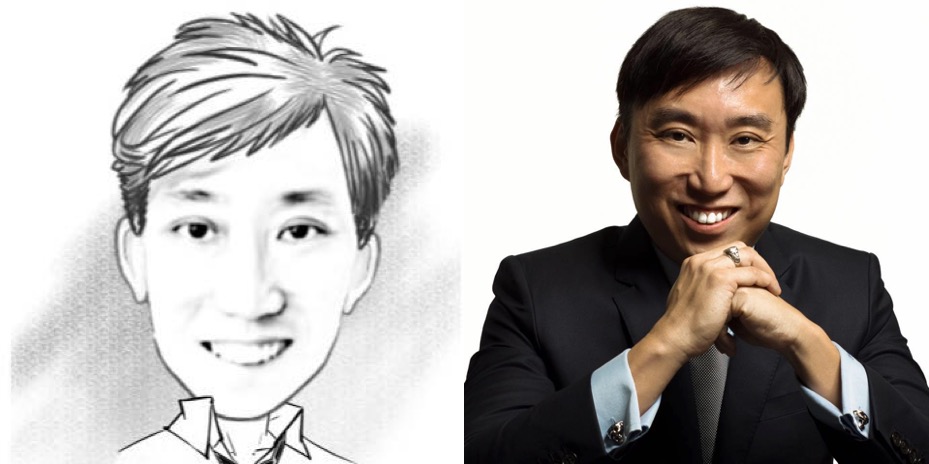If you've hung around Singapore's internet space long enough, chances are you'll recognise some of the names of people who share their opinions on things online.
One of these vocal Singaporeans whose opinions you might have read about is Calvin Cheng, known for his strongly-worded commentary on politics, society and a wide range of issues of the day.
And it was the same for me — after reading so many of his posts and comments over the years, it was tricky to bridge the disconnect between all that and the Calvin Cheng I would meet in person.
I'm not gonna lie — it was a surreal experience.
Not because I didn't know what he looked like — yes, there are photographs of him on his Facebook page — meeting the prime ministers of Malta and Mongolia, for instance:
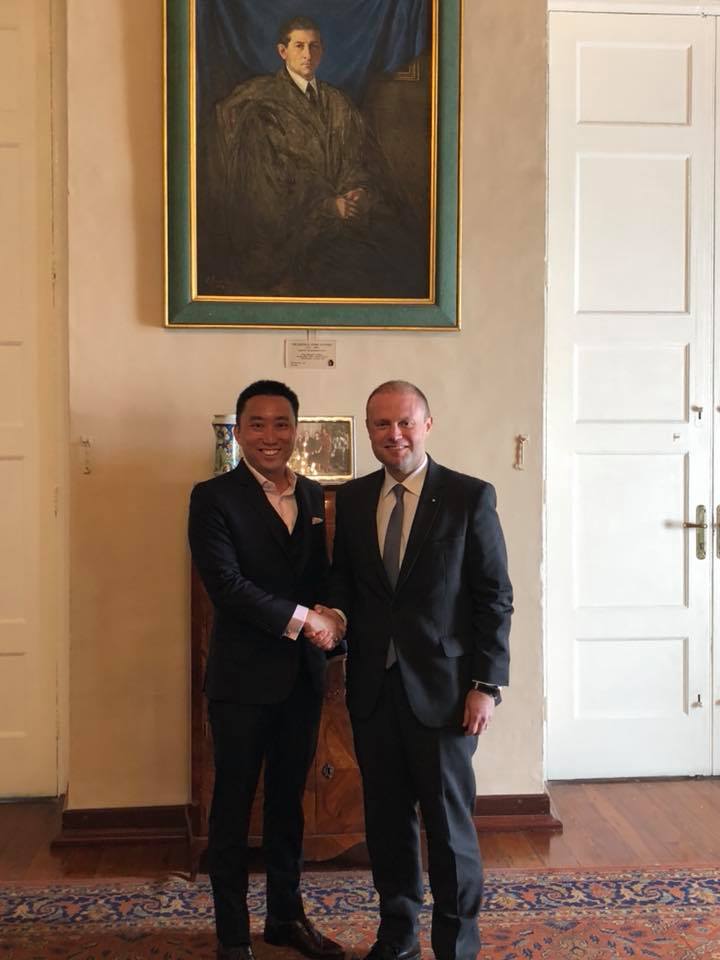 Photo via Calvin Cheng's Facebook page
Photo via Calvin Cheng's Facebook page
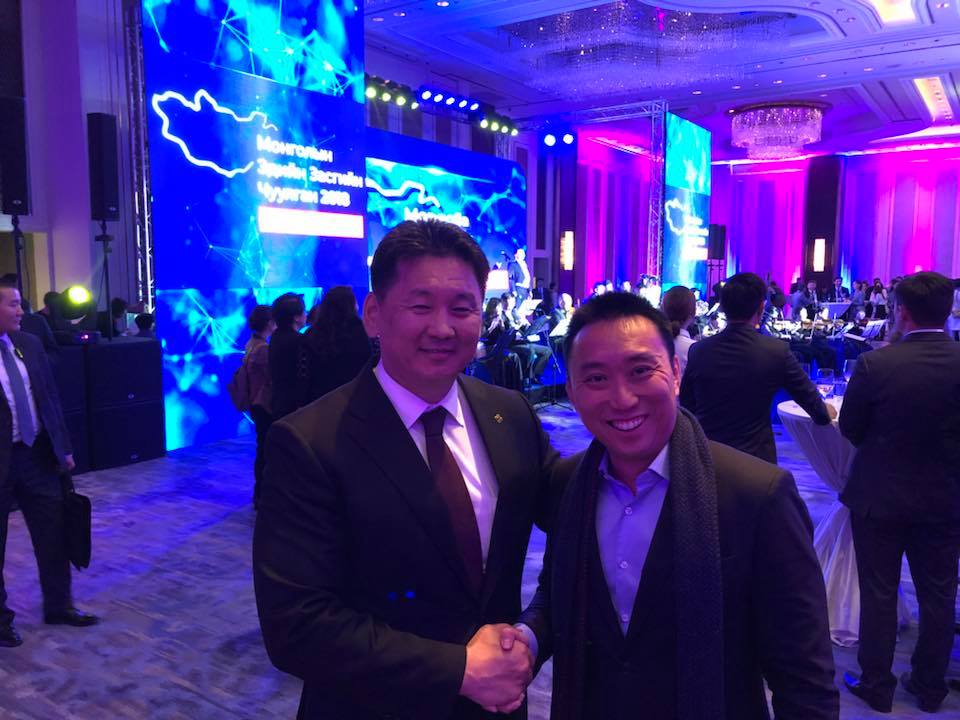 Photo via Calvin Cheng's Facebook page
Photo via Calvin Cheng's Facebook page
And yes, in person he does look pretty much like that.
I must admit, until Cheng was face-to-face with me, I struggled to reconcile the stridently pro-establishment, harshly-worded Facebook posts, the fierce comment wars he would wage against other people, and the person whose hand I was shaking.
For truly, who is Calvin Cheng?
1) The one who always speaks his mind
To his teachers, classmates and principal at the then-named Chinese High School, Cheng is distinctively one who speaks his mind, without fear or favour.
[related_story]
Perhaps, he ventures, it's because on one occasion a young teenage Cheng stood up in a morning assembly of his entire school to "scold" his principal, whom he recalls was "trying to put down ACS (the Anglo-Chinese School) and RI (Raffles Institution)":
"I think he said something that I didn’t agree with, and I think people were quite shocked — especially in Chinese High where we’re very Chinese, where we need to be deferential to authority.
And then, you know, I stood up and said we should be confident in ourselves; we shouldn’t need to put down other people, you know, in order to feel happy about ourselves."
The principal was, of course, visibly taken aback, Cheng recalls.
To Cheng's surprise, he was open-minded enough to engage Cheng in a short discussion — still in front of the whole school — and that exchange left a deep enough impression on his form teacher to note in Cheng's school-leaving testimonial that he "speaks his mind... and this could be an advantage in life, but also a disadvantage in life".
"But I mean, that's always been me... I think if it's worth saying, don't be scared, right? Just say it."
And we do see this translate into his commentary online.
Take his input on the Junior College mergers, for instance:
And his take on the transition in leadership at SMRT:
As well as more recently, his explainer on the implications of women and men paying the same in CareShield Life premiums:Evolving his approach to social media
Cheng shares with us, however, that over the years, he recognised that while his views (and personality) may not change, the online environment has — comparing the 2011-2015 period and now, post General Election 2015:
"So there was a lot of chaos, there was a lot of fighting — I guess I was involved in some of that fighting — but I think you have to, because... there are times to be peaceful and there are times to be aggressive and I think, in times of chaos and aggression, sometimes you have to speak a bit louder to get heard.
But I think we have reached the point of equilibrium now? I think the internet has quietened down, not only in Singapore but all over the world. People are finding their feet about this new technology, how it should be used. It's not the utopia that some people think; it's also not the hell that some people think."
As the internet space is no longer as chaotic as it used to be, Cheng says he has, in turn, stepped back from the active participation he used to display in online debate — whether on his own page or outside of it.
"I've actually slowed down a lot on social media. Cause I have come to realise that it can be quite harmful... not only to relationships but to our own personal lives.
If we live all our life on social media, especially with Facebook's algorithms, which shows you what you want to see, it divides us up into silos or demographics that are similar. So you get a very warped view of life.
So you have to go out; you have to get out and meet people."
Meeting his online "enemies" in real life
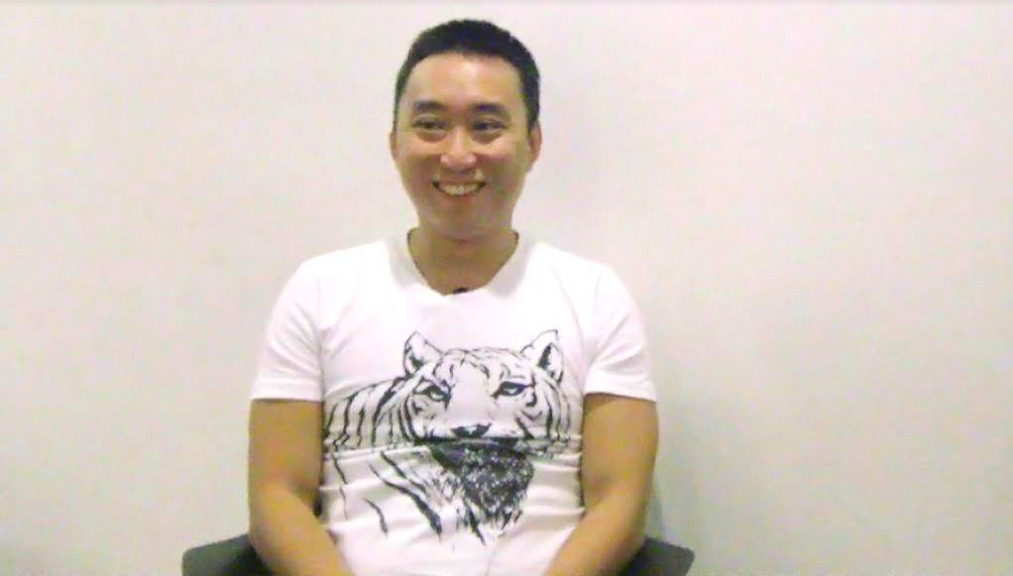 Photo by Ilene Fong.
Photo by Ilene Fong.
And meet he did — incredibly, Cheng estimates that he has met 90 per cent of the people he has fought with in his years being active online in person.
"I always make sure that for all of... most of these guys, even during the chaotic times of 2011, 2015, I would try to ask them out for coffee. So they can look me in the eye and see me, and then... I can see them! Then we're two human beings interacting, not two faceless names.
A lot of them I actually met, face to face. Because I believe in human interaction, and without that face-to-face connection, you cannot build a relationship, right? So, of course personas online will be different... because every human being is a multi-faceted individual, right? And in order for you to understand someone, you need to meet the person face to face."
What happened with the other 10 per cent?
Some rejected his invitation, some, he says he didn't have the "opportunity" to meet.
He qualifies that post-2015, his work made him travel a lot and so these meetings had to take a backseat. But ultimately, he says he has to make an effort to reach out to everyone who strongly opposes him —
"A lot of the opposition activists that I've met, a lot of them are very fierce online, very aggressive, they can be a bit rude... actually offline they are very sweet and very demure, very quiet, very nice people."
2) The unexpectedly Nominated MP
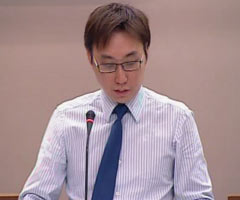 Photo via
Photo via
Another thing you may know about Cheng is that he is a former Nominated Member of Parliament (NMP).
His just-shy-of-two-year term, between July 2009 and May 2011 (when Parliament was dissolved for the 2011 election), took place prior to the awakening of Singaporeans' political consciousness online and on Facebook — so, he feels, it was "a lot tamer".
Cheng says this was something he didn't expect to happen, and became reality in defiance of his expectations — which, he explains, were none, really.
"I think a few friends asked me whether (I was interested to be an NMP) because they knew I was outspoken, that I had views, I was opinionated, I was interested in politics, but I wasn't interested in being a politician, because that would entail me doing a lot of things that are not actually compatible with my personality because a politician actually has to bite his tongue a lot right? ... but yet... they felt that I had things to contribute...
I didn't actually think much about it, so they put me up, I was called for interview, I went for the interview, and I suddenly got the call to say that I got selected so it was a bit of a shock."
Interviewing Cheng was a panel that included MP veterans Mah Bow Tan (former Minister for National Development who stepped down from Cabinet after GE2011) and former Workers' Party chief Low Thia Khiang.
He says he wasn't intimidated — the only man in Parliament who made him very nervous was the late Lee Kuan Yew, who could even strike fear into his heart by walking into the toilet while he happened to be there too.
Perhaps this was in part because ahead of his maiden speech — back in August 2009, he was next to speak on a motion on the National Pledge after veteran and former opposition MP Chiam See Tong — he had his queue cut by Lee, who would then deliver one of his final, and also most impactful, speeches in Parliament (fun fact: it was also where he would introduce to Singaporeans the term "highfalutin").
This, of course, sent a frightened Cheng scrambling to scour his speech for any areas that may contradict what Lee was saying.
On hindsight, Cheng feels he might have been too young when he served as an NMP.
He was 33, after all, describing himself as not being experienced enough. "Frightened" and "nervous" were also adjectives he used on himself a couple of times in our conversation about his time as an NMP.
He also says it would be "very much hubristic" to think he was able to make a difference to Singapore during his time as an NMP.
However, he did come to know and try to help individuals and small groups of people who approached him with challenges they faced during his term.
"I think the best way to make a difference is to help people one person at a time. If you find someone that is in need, someone who comes to you and says that 'I need help, do you think you can help', you help. And I think that is the best way to make a difference."
3) The unabashed egotist
One thing I have to say is that Cheng took my hard questions and answered them directly — no obfuscation or skirting done here — and that was something I had a newfound admiration for.
Yes, he started his Facebook page to amplify the pro-establishment perspective
For starters, he acknowledges that he started his Facebook page, after stepping down as an NMP, in response to what he felt was an internet space where conversations were "veering too much to one side".
The anti-PAP, anti-establishment side? I asked. Yes, he responded.
"There were things I wanted to say, so I set up the page. And to speak up on issues that people were fearful of speaking up on, because they didn't want to be trolled (by anti-establishment-leaning folk)."
Yes, he has a big ego and isn't ashamed of it
He also agrees he "can be quite egotistical", adding that a lot of high-achievers probably have big egos too. But he says this also means he is self-confident, and believes strongly in his ability to change and accomplish things he sets out to do.
He says his big ego also helps in the face of the waves of attacks and critique he has faced in — let's admit it — spades over the past few years of his being active online, because he is secure in and with himself and is able to stand by his views.
And yes, he admits he was "a bit careless" in that particular comment he made
Cheng even talks about the comment he made about terrorists — this one:
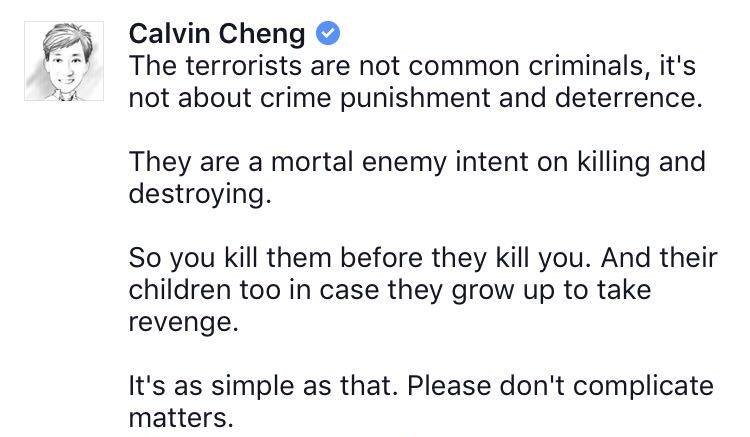 File screenshot
File screenshot
Subsequently, Cheng also had said back then that his thinking behind this comment was informed by a CNN article demonstrating the challenges of rehabilitating child soldiers under terrorist regimes.
"I wasn't thinking, I was a bit careless, and then unfortunately it was right after the general elections, and I was very loud during the elections, and... I guess people found that it was a good chance to get back at me."
Quite a furore erupted as a result of Cheng's comment, in particular because he happened to be a member of the Media Literacy Council (MLC) at the time.
It led to him issuing an apology to the MLC amid calls for his removal from the panel too — not to mention the abuse he certainly received in public and in private messages.
And how'd he get through that period? He says he just had to "take it on your chin, and move on".
"... as long as you believe that you've done nothing wrong, and that you're true to your beliefs, then... you just have to take it on your chin and see it as a learning experience."
4) The People's Action Party member...?
Is Calvin Cheng a PAP, or even a YPAP, member?
The answer, actually, is that he was a YPAP member.
Cheng explains that he tagged along with a friend who was trying to persuade him to join the Young PAP — a youth branch of the PAP that he feels is "not as political in a way".
"So we walked into a branch, he sat me down, gave me a form. So I signed up. But... I really never picked up my card. I was never active with the YPAP... I never got the time to be active, not because I didn't want to, but I never got the time to be."
Instead, he volunteered with the Red Cross, feeling it was a "more impactful" endeavour.
And was he invited to tea?
Well yes, of course he was.
He sat down with now-Transport Minister Khaw Boon Wan and a few others, but made it "very clear" he was not at all interested in party politics:
"Those who have known me for a long time would know that I would hate it, you know? Because at the end of the day, politicians have to be popular and… I don’t care about popularity, I have never cared about popularity, so I would be very unhappy if this had to be something I needed to be, to think about all the time."
But all that said, he says he really doesn't care whether people think he is with, outside, pro- or against the establishment.
It doesn't matter, nor does it make him happy or sad to be regarded either way, and it doesn't impact his life in any way.
And as pro-establishment as he often seems to sound, Cheng also thinks it is in Singapore's interest to have a strong political opposition.
And that was my meeting with Cheng — he was honest, game to answer all my questions, and seemed as upfront as he could be about everything we discussed.
I will admit, meeting him in person definitely helped me to see him differently.
Surreal, yes, but I came away pleasantly surprised.
Top photo from Calvin Cheng Facebook page.
If you like what you read, follow us on Facebook, Instagram, Twitter and Telegram to get the latest updates.
